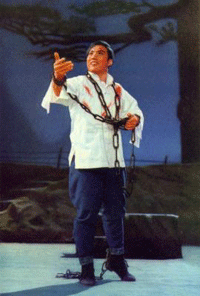Jason McGrath, Assistant Professor, Asian Languages and Literatures, University of Minnesota-Twin Cities
From the critical realism of the Left-Wing Film Movement of the 1930s to the socialist realism and “revolutionary romanticism” of the early People’s Republic and finally the model opera films of the Cultural Revolution, Chinese revolutionary cinema saw a “formal drift” away from the cinematic aesthetics of realism. This drift accompanied a shift in the idea of the "real" from an existential category to an epistemological or even metaphysical category. Ironically, the formal drift in revolutionary cinema, though corresponding to an ever increasing importance of ideology, may have helped to set the stage for the collapse of the authority of Maoism.

